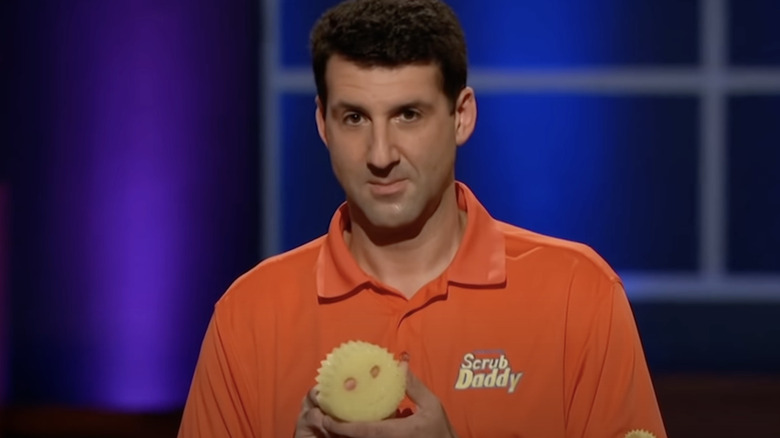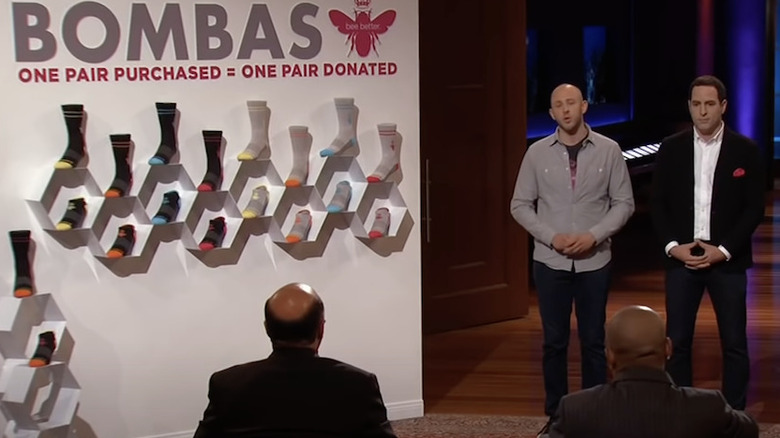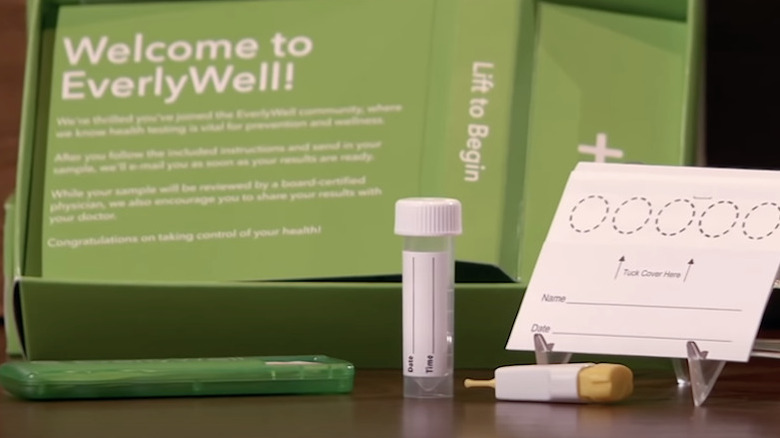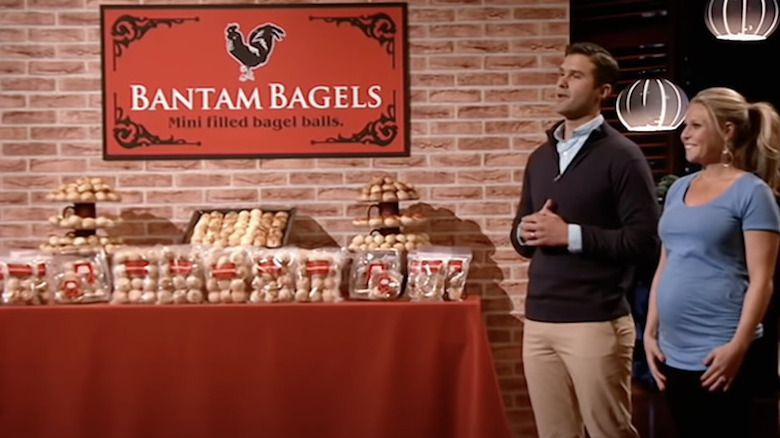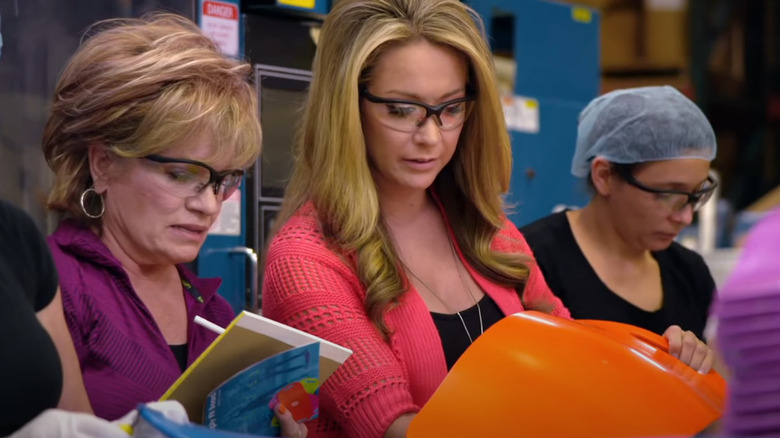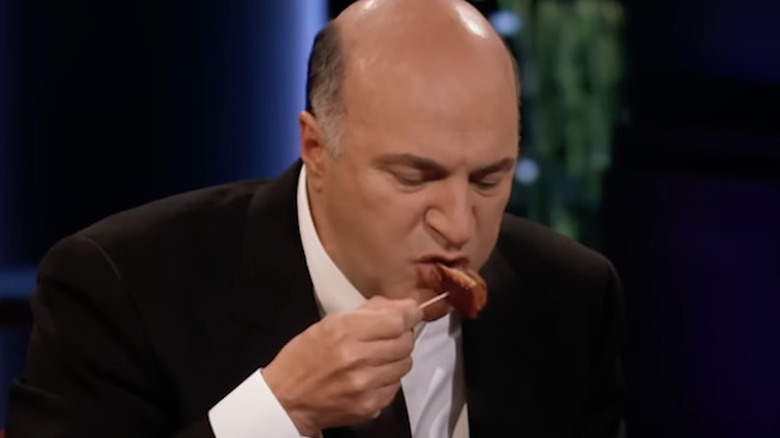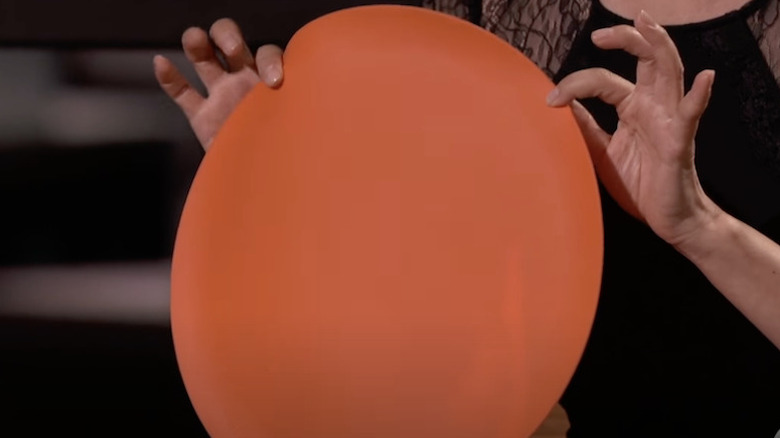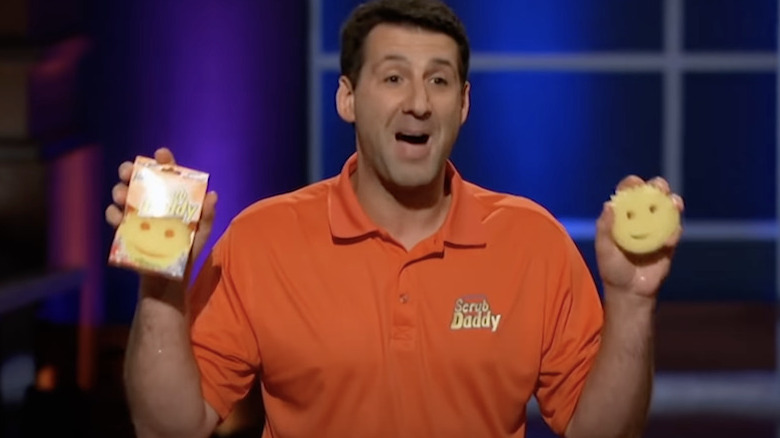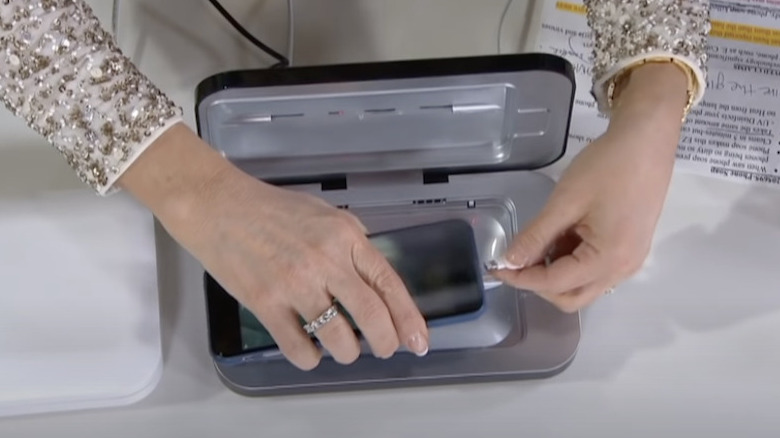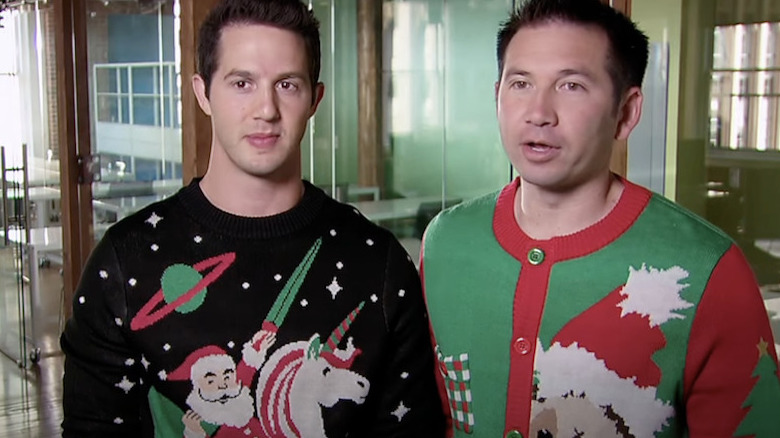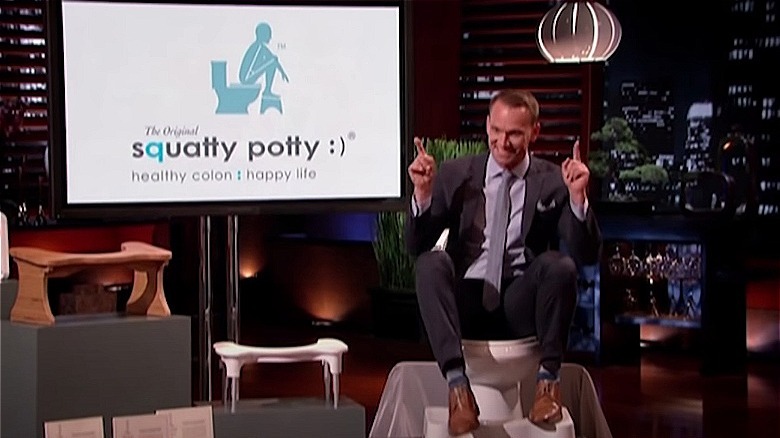Everyday Things You Didn't Know Got Their Start On Shark Tank
This content was paid for by Sony and created by Looper.
One of the most popular reality shows ever, "Shark Tank" offers a look into the worlds of inventors, small business owners, industry, finance, and top-level wheeler-dealers and barons of industry. Over the span of more than 300 episodes airing across more than a decade, upwards of a thousand entrepreneurs have entered "the Tank" to face off with "The Sharks": five angel investors and venture capitalists with a proven track record of business success. If all goes according to plan, they'll explain their proposal for their unique and innovative product or service, and at least one of the Sharks will agree to give them the hefty sum they've requested to take their business to the next level, in exchange for a moderate equity share of their company.
Hundreds of people with good ideas and good products have emerged from the tank with a much needed lifeline for their business, but only a lucky and industrious handful of those entrepreneurs have experienced the promise and dream of "Shark Tank" to its fullest — for their creation to become a household name, fully incorporated into the daily lives of millions. Here are the most famous and important products to emerge from "Shark Tank."
Bombas socks
The sixth season of "Shark Tank" got underway in 2014 in a big way, with what would turn out in the long run to be the biggest revenue-generating product that received financial backing from the long-running investment reality series. All it took to hit big and make that big impact was something almost impossibly soft: next-generation socks (and later T-shirts) made with a fabric blend that allowed smoothness and comfort to come first.
Randy Goldberg and David Heath entered the Tank in search of $200,000 in exchange for a five percent stake in their company, Bombas, a manufacturer of high-quality, eye-catching, and very, very soft socks. Right away, four of the five Sharks passed, and Daymond John was about to do the same until he asked for a 17 percent cut for his 200 grand. That turned out to be a wise investment for all parties concerned, because by 2021, Bombas had generated sales of $225 million, making it the most lucrative brand in "Shark Tank" history, with consumers ready and willing to shell out for the company's comfortable socks, T-shirts, undergarments, and slippers.
EverlyWell test kits
Until the last decade or so, the idea of food allergies and sensitivities weren't commonly known outside of some individuals' potentially fatal physical aversion to peanuts. But in this era of rapid scientific breakthroughs, technological developments, and widely disseminated information, more and more people have become aware of the negative physical effects they may suffer from different types of food, including wheat and dairy. This phenomenon has coincided with the rise of easy, affordable at-home medical testing for any number of medical conditions, and a big player in that field is EverlyWell, a company that got a lot of exposure and a generous cash infusion after appearing on "Shark Tank" in 2017.
Founded by Julia Cheek in 2015, the company manufactures a big line of at-home medical testing kits that check for food sensitivities, hormone levels, deficiencies, the presence of toxins, and more. Lori Greiner ponied up the $1 million Cheek sought from "Shark Tank" in the form of a line of credit in exchange for a five percent stake. It paid off: Thanks in part to an at-home COVID-19 test kit, EverlyWell's market valuation sits at around $13 billion.
Bantam Bagels
A traditional European-Jewish baked good with a history dating back centuries, the bagel is now thoroughly entrenched into American cuisine. Spongy but dense on the inside, crispy but light on the outside, bagels are incredibly adaptable and their qualities complement all kinds of toppings and additions, creating a huge market for flavored bagels, bagel sandwiches, microwavable mini-bagel pizzas, and frozen, heat-and-eat bite-size bagels. One of the most notable, commonly found, and widely consumed bagel-inspired food products is Bantam Bagels. Found in the frozen food section (and at thousands of Starbucks outlets) and quickly heated up and easily eaten on the go, they're made up of balls of baked bagel dough. And the cream cheese, usually found atop a sliced and halved bagel? That's stuffed inside.
Bantam Bagels started out as a single bakery in New York City's West Village in 2013, founded by former stockbrokers Nick and Elyse Oleksak. After a lot of media attention spurred business growth, the Oleksaks took their bagels to "Shark Tank" in 2015. After some negotiations, Lori Greiner invested $275,000 in the company for a 25 percent stake, which paid off big when the Oleksaks sold Bantam Bagels to Lancaster Colony in 2018 for $34 million.
The Simply Fit Board
Most anyone who exercises regularly for the sake of physical fitness, improved health, or a fitter appearance does so with an eye toward a flat stomach or toned abdominal muscles. The general marketplace is happy to oblige the millions of consumers in search of the right product that will help them reach that elusive goal with any number of gadgets and pieces of exercise equipment that claim to strengthen, build up, or rework abs. Of the many such products available, one of the top selling and easiest to use is also the simplest, both in conception and construction.
The Simply Fit Board is a thick piece of shaped plastic with a dip in the middle that the user stands on. They must constantly maintain balance while they stand in place and twist their body, back and forth, repeatedly, working their abs and sides as they do so. Invented by mother-daughter team Linda Clark and Gloria Hoffman, the Simply Fit Board appeared on "Shark Tank" in 2015. With $1 million in sales already, Clark and Hoffman asked for a $125,000 investment for a 15 percent share. Lori Greiner put up the cash and negotiated an 18 percent share, which certainly made the Shark a lot of money — $160 million worth of Simply Fit products have sold since the "Shark Tank" exposure and deal.
Bubba's Q boneless ribs
It's no accident that "Bubba's Q" sounds a lot like "barbecue." The name firmly links the product to its category, a crowded marketplace, giving it an edge over competitors. Bubba's Q also differs from the other many sauced smoked meats available in that it sells a fully cooked pork product that's already been sauced with the bones removed, making for a much more convenient meal. Consumers definitely want what Bubba's Q is selling — as of August 2022, the company boasts annual revenues of $5 million worth of boneless ribs. Seeing as how the Bubba's Q restaurant closed in 2019 after 13 years, that's all from sales of packaged ribs, made famous by a spot on "Shark Tank."
In 2013, Al "Bubba" Baker appeared on the financial reality TV show to promote and bolster Bubba's Q Boneless Baby Back Ribs. The former NFL defensive lineman sought a $300,000 cash infusion in exchange for a 15 percent equity stake. Daymond John offered the sum requested, but negotiated a 30 percent share, which led to continued growth and attention for Bubba's Q's line of barbecue products.
Silicone mats
Thin, colorful silicone mats are a common kitchen contraption, simply built but effective for a number of uses, be it a jar opening assistant, trivet upon which to place hot dishes, a bowl cover, a splatter guard, a pot holder, or a microwave liner. Just silicone circles have become ubiquitous thanks in part to Safe Grabs, which are sold in multi-packs in an array of colors.
Made of food-grade silicon and free of potentially harmful BPAs, Safe Grabs got a jump on other manufacturers with an appearance by its creator on "Shark Tank" in 2016. Inspired by a lifelong tendency to burn her fingers when taking hot plates right out of the microwave, inventor Cyndi Lee went into the tank seeking $75,000 for a 12 percent stake in her company. Lori Greiner upped that to a 25 percent stake, clearing the way for Safe Grabs to cool down kitchens nationwide.
Scrub Daddy
Anybody with a kitchen has to wash their dishes somehow — and they've usually got to have some kind of sponge or scouring thing with which to wash those dishes. As such, millions of people over the last decade have chosen the Scrub Daddy. Aaron Krause created the 21st century's relatively high-tech answer to the sponge.
He ran a manufacturing operation that left his hands greasy and oily and the only thing that got them clean was a special kind of foam. He developed that substance to a circular object, with two holes in the middle through which he could stick his fingers and clean them. The holes looked like eyes, he added a "smile," and that's how he came up with Scrub Daddy. They sold okay, but after failing to gain any attention from big retailers, Krause took Scrub Daddy onto Shark Tank in 2012, where Lori Greiner offered $200,000 for a 20 percent equity stake. Now available for a few bucks at dozens of stores and outlets, more than 25 million Scrub Daddy products have been sold.
UV smartphone cleaners
By May 2012, smartphones had been widely available for less than half a decade, but they'd already reached critical mass and had become a can't-leave-home-without, can't-live-without, multiple-gadget-replacing, ultimate-accessory of modern life. The downside of all that phone usage is the transmission of germs, bacteria, and viruses — everybody touching their phones hundreds of times a day, after touching countless other things, leaves a lot of nasty microscopic stuff behind on that little touchscreen. The market showed an opening for smartphone cleaning tools, and Wesley Laporte and Dan Barnes filled that niche with PhoneSoap, a device that charges a phone while also sanitizing and decontaminating it via mess-free UV light rays.
The cleaner, and other companies' similar products, reached cultural and retail saturation in the wake of the COVD-19 pandemic, but PhoneSoap was an early entry into the field. Laporte and Barnes pitched their wares on "Shark Tank" in 2012, asking for $300,000, an offer Lori Greiner took, in exchange for a 10 percent stake in the booming business.
Ugly Christmas sweaters
The winter holiday season is built for traditions, when millions of people celebrate the most wonderful time of the year in the same cherished ways — the eggnog and fruitcake emerge, radio stations switch to an all-Christmas music format, and individuals and offices all over throw casual get-togethers and parties where people are encouraged to dress in holiday attire. In recent years, the "ugly Christmas sweater" has taken over the Christmas clothing niche. These old-fashioned, seemingly homemade garments depict familiar holiday tropes and use common holiday colors to garish, over-the-top effect, forming into something so unattractive that it's fun and kind of pretty.
Tipsy Elves is largely responsible for the "ugly Christmas sweater" fad becoming what it is. Evan Mendelsohn and Nicklaus Morton formed their company right at the cusp of the trend, and presented their line of goofy Christmas clothes on "Shark Tank" in 2013. Already selling sweaters in more than 200 countries by that point, and sponsoring "National Ugly Christmas Sweater Day," Robert Herjavec wrapped up the "Shark Tank" pitch by offering $100,000 for a 10 percent stake.
The Squatty Potty
The Squatty Potty spawned nothing less than a minor revolution in the intimate and universal act of the way people use a toilet to do their bathroom business. It's an inexpensive, inconspicuous, and portable foot-stool and posture correction device. According to entrepreneurs Bobby and Judy Edwards, biological evidence suggests that human beings are supposed to squat when they evacuate their bowels — and not sit upright or hunched over, the position using a western-style toilet demands. Going the "wrong" way for so long may even lead to poor colon health and painful hemorrhoids. To help those of us who don't want to give up on their in-house thrones, Bobby Edwards invented the very first Squatty Potty, a shaped shelf upon which one rests their feet while using a standard toilet, gently forcing the body into more of a squatting position, and thus putting less strain on their undercarriage and digestive system.
The Edwardses were already well on their way to moving millions of Squatty Potties when they appeared on "Shark Tank" in 2014, asking for $350,000 for a five percent stake. Intrigued by the multi-million-dollar sales figures, Lori Greiner dropped $350,000 for 10 percent of Squatty Potty.
